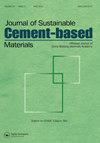Rheology control of limestone calcined clay cement pastes by modifying the content of fine-grained metakaolin
IF 4.2
3区 工程技术
Q1 CONSTRUCTION & BUILDING TECHNOLOGY
Journal of Sustainable Cement-Based Materials
Pub Date : 2023-02-07
DOI:10.1080/21650373.2023.2169965
引用次数: 3
Abstract
Limestone-calcined clay-cement (LC3), as one of the most promising sustainable cements, has been under development over the past decade. However, many uncertainties remain regarding its rheological behaviors, such as the metakaolin content of calcined clay. This study aims to investigate the effect of increasing the content of fine-grained metakaolin in calcined clay on the rheology of LC3 pastes. Rheological behaviors and early-age hydration of studied mixtures were characterized using flow curve, constant shear rate, small amplitude oscillatory shear and isothermal calorimetry tests. Results show that increasing the content of fine-grained metakaolin decreased flowability but promoted structural build-up and early-age hydration. These phenomena can be attributed to the decrease of mean interparticle distance caused by the increased amount of fine-grained metakaolin, which may enhance colloidal interactions, C-S-H nucleation and direct contact between particles. Overall, modifying the fine-grained metakaolin content is a feasible approach to control the rheology of LC3 pastes.通过改性细粒偏高岭土含量控制石灰石煅烧粘土水泥浆体的流变性
石灰石煅烧粘土水泥(LC3)作为最有前途的可持续水泥之一,在过去十年中一直在开发中。然而,其流变行为仍存在许多不确定性,如煅烧粘土中偏高岭土的含量。本研究旨在研究煅烧粘土中细粒偏高岭土含量的增加对LC3浆体流变性的影响。利用流动曲线、恒定剪切速率、小振幅振荡剪切和等温量热测试对所研究混合物的流变行为和早期水合作用进行了表征。结果表明,细粒偏高岭土含量的增加降低了流动性,但促进了结构的形成和早期水化。这些现象可归因于细粒偏高岭土含量的增加导致平均颗粒间距离的减小,这可能增强胶体相互作用、C-S-H成核和颗粒之间的直接接触。总之,改性细粒偏高岭土含量是控制LC3浆体流变性的可行方法。
本文章由计算机程序翻译,如有差异,请以英文原文为准。
求助全文
约1分钟内获得全文
求助全文
来源期刊
CiteScore
6.60
自引率
15.90%
发文量
71
期刊介绍:
The Journal of Sustainable Cement-Based Materials aims to publish theoretical and applied researches on materials, products and structures that incorporate cement. The journal is a forum for discussion of research on manufacture, hydration and performance of cement-based materials; novel experimental techniques; the latest analytical and modelling methods; the examination and the diagnosis of real cement and concrete structures; and the potential for improved cement-based materials. The journal welcomes original research papers, major reviews, rapid communications and selected conference papers. The Journal of Sustainable Cement-Based Materials covers a wide range of topics within its subject category, including but are not limited to: • raw materials and manufacture of cement • mixing, rheology and hydration • admixtures • structural characteristics and performance of cement-based materials • characterisation techniques and modeling • use of fibre in cement based-materials • degradation and repair of cement-based materials • novel testing techniques and applications • waste management

 求助内容:
求助内容: 应助结果提醒方式:
应助结果提醒方式:


